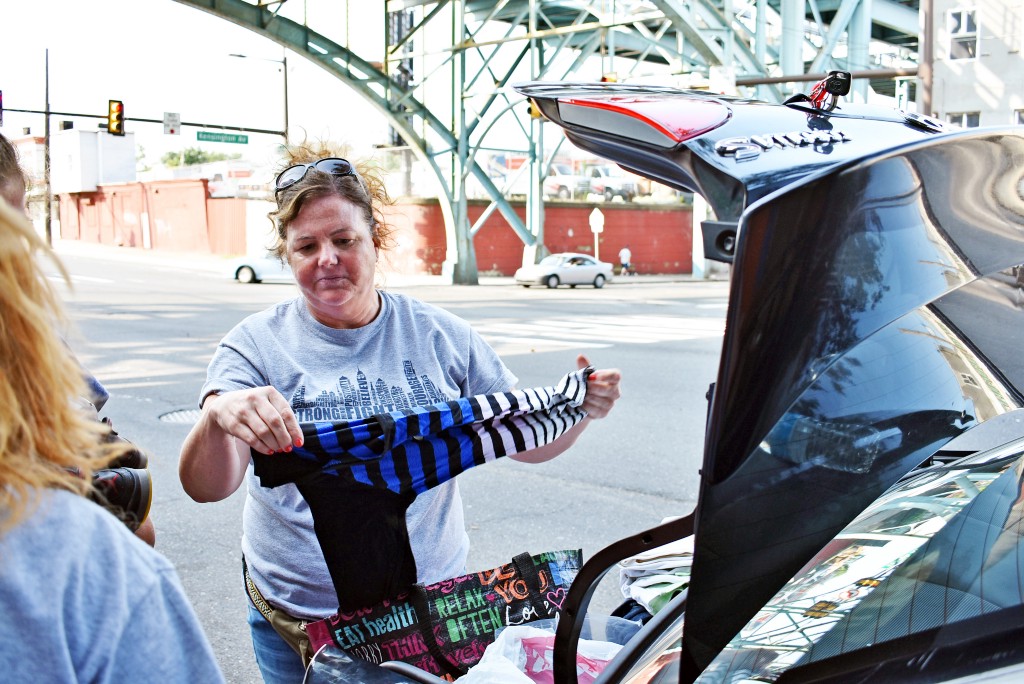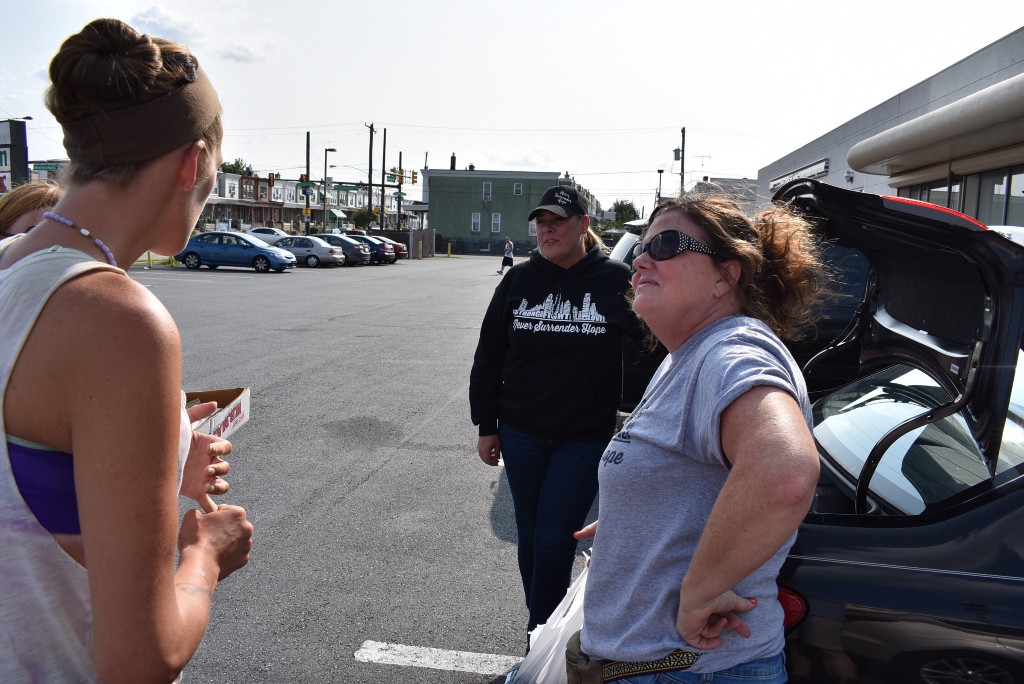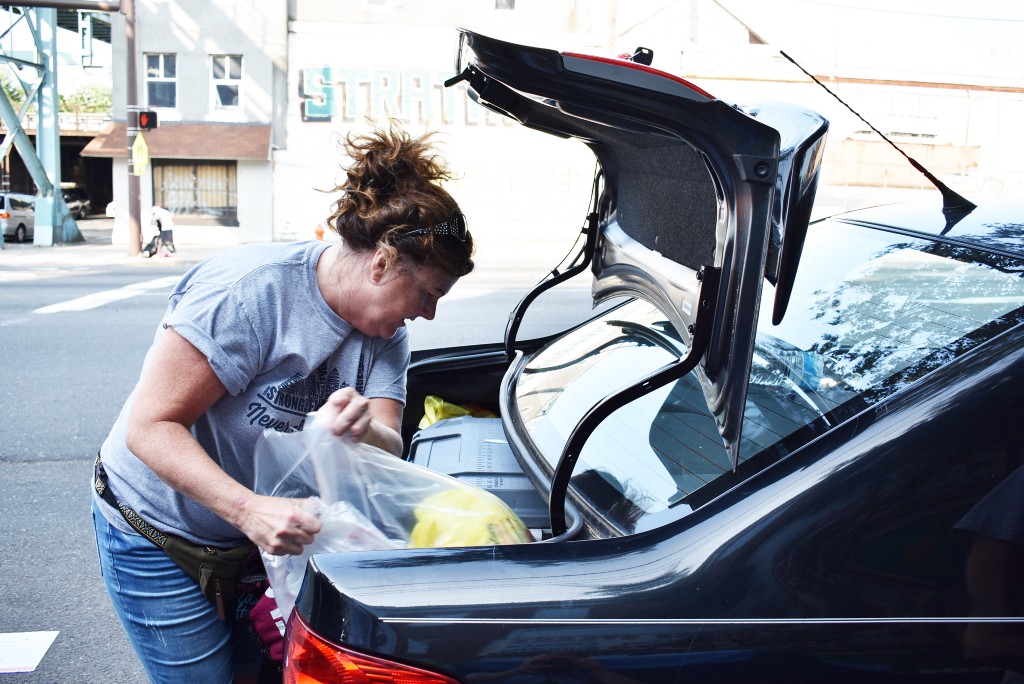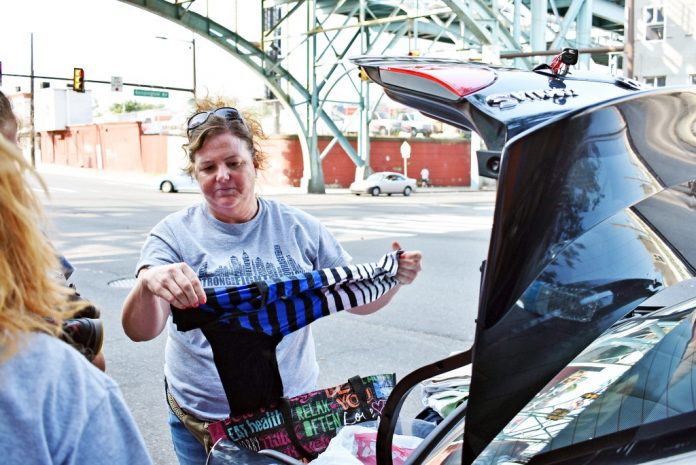Never Surrender Hope is a nonprofit made up of mostly moms from the Northeast who offer supplies and help to people suffering from addiction and homelessness.

Valerie Felici tried to explain to Taz how important it was to call her again and again.
They met in the Aramingo Village plaza parking lot at Aramingo and Castor avenues. Felici, along with Joanne Shorten-Lieb and Terri Romano, are frequent visitors of Taz’s, who usually panhandles and resides around the area.
Taz had already broken a promise to call them before, saying his phone had been stolen.
“I don’t want you to worry about any of that, because that’s what we’re for,” Felici told him. She, or any of the other members of Never Surrender Hope, would get him to treatment. She promised to help him get an ID if that was an issue, along with correctly sized clothes and shoes.
“While you’re detoxing, they’re going to find you a bed,” she told him. “If they run into a problem finding a bed, you’re going to call me.”
Taz seemed adamant about returning the call, so the three women left him to continue their usual route along Aramingo Avenue. But Felici hasn’t heard from him since their Aug. 22 conversation, even when she went looking for him the next day.
But Never Surrender Hope is named that for a reason, and the women — mostly mothers, all impacted by addiction in some way — will continue looking out for him, as they do for others all across the city.

Never Surrender Hope is a nonprofit dedicated to helping people struggling with addiction and homelessness. Many times a week, members of the 20 or so core group of women (affectionately called “girls”) will drive to visit and deliver supplies. Most of the women are from the Northeast.
They typically take two or more vehicles, but today the three women crammed themselves into one along with bags of snacks and clothing, a cooler and a tray of bagels and muffins donated by Panera Bread. They volunteer their own time and money.
Perhaps most importantly, they offer to assist people in getting help through the treatment process. At each stop, they get out of the car and have conversations with the people they’re helping.
“Sometimes, that helps more than food or clothes,” Felici said.
Cristin McHugh, who was one of more than a dozen people who met the girls at Kensington and Lehigh avenues, said she’s talked with them when they come around at least once a week for more than a year.
“They help you with anything you need help with,” she said. She said she eats one snack from her snack bag each night to make it last the week. “They stop once a week in certain areas, and we all know where they stop and what time.”
McHugh’s temporary uplift from their visit didn’t last long. As soon as she crossed the street away from the girls, a passing driver shouted out his window for her to “shoot up and die already.”
“You OK, hon?” Romano asked as Shorten-Lieb made a U-turn so they could check on her. McHugh insisted she was, though the look on her face betrayed that she wasn’t.
“We don’t ask you to agree with us on all terms, we just ask you to maybe listen to the facts and the things that we do, and listen to what they’re going through, and maybe not be so judgmental,” Felici said.

Felici’s attachment to the cause is personal. She watched her son become addicted, and it started as just one pill at a keg party.
“Suddenly, one [pill] isn’t working and two’s not working and three’s not working and it’s getting very expensive,” she said.
She recalled holding her son in her arms helplessly, thinking she was about to watch him die from an overdose. Luckily, help arrived in time.
But luck is not a familiar concept in the opioid epidemic. Romano and Shorten-Lieb had to leave as soon as the route was over to take another mom who had recently lost her son to overdose out to dinner.
“The people really become part of you,” Romano said, referring to the people they help as well as the moms. “If we don’t see someone for a while, we just pray they’re in recovery and not dead. I have a 21-year-old and I always see his face in every person I meet.”
For Shorten-Lieb, joining the nonprofit was simple.
“I’m not one to sit back and watch people die. I have to get involved,” she said.
This outing was on the smaller side, as the girls’ schedules with helping out the mom who lost her kid was abbreviated. They weren’t joined by Cathy Connor and Trish Hampton, two girls who frequently take time out of their weeks for trips.
The nonprofit, which was founded by Felici, Sally Carr and Kathleen Wilson, will host a fundraiser the week of Oct. 14 at Beneficial Bank at Academy Plaza, 3202 Red Lion Road. They will take collections for the week.
Before the women finished up their route, they made a few turns in Kensington looking for a couple named Jackie and Joe who they haven’t seen in a while. They didn’t find them, and had to head back to make it to the dinner on time.
But a few days later, the couple reached out to them.
“We got them into treatment,” Felici said. “Two more off the streets and on the road to recovery.” ••





